| Monday 7 july 2003 Time : 7:30 pm
|
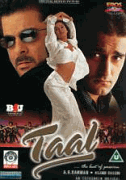
TAAL
(1999) - directed by Subhash Ghai
Sentimental, corny, lavish and hugely entertaining, TAAL takes elements of ROMEO AND JULIET, Douglas Sirk -style melodrama and Bob Fosse (Baba Fosse) musicals, throws them in a blender and hits frappe. Its another Bollywood spectacular that really delivers the goods. It has a brilliant score by A.R. Rahman, the great Indian music composer and producer.
In June, Third Eye Film Society had a big turnout for DIL SE. If you have yet to have the Bollywood experience, come see what all the fuss is about.
|
| Tuesday 15 july 2003 Time : 7:30 pm
|
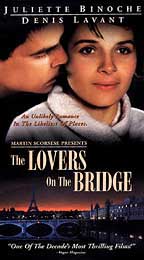
LOVERS ON THE BRIDGE
directed by Leos Carax
Les Amants de Pont Neuf was three years in the making and, now known as The Lovers on the Bridge, has taken twice that long to get an American release. Written and directed by then enfant terrible Léos Carax, this wildly romantic anti-romance was attacked for its shameless extravagance and praised for more or less the same reason.
Cahiers du Cinema devoted an entire issue to Carax's vision of lowlife l'amour fou. Lovers on the Bridge was included in the 1992 New York Film Festival (and, championed by Film Comment, has been shown several times at the Walter Reade) but, so far as presumptive distributors were concerned, it never recovered from Times critic Vincent Canby's bemused assessment—"one of the most extravagant and delirious follies perpetrated on French soil since Marie Antoinette played the milkmaid at the Petit Trianon."
True enough, but Lovers on the Bridge is as exalted as it is ridiculous—an outrageously contrived paean to freedom, a crazy mixture of scabby naturalism and rock-video mescaline staged on a movie set worthy of Stroheim. Carax expended most of his budget reconstructing a chunk of Paris—including the Pont Neuf, the quays along the Seine, the facade of the Samaritaine department store, and part of the Ile de la Cité—as the backdrop for the grand passion that consumes two of the world's scruffiest lovers, the half-blind street-artist Michele (Juliette Binoche) and the alchoholic street- performer Alex (Denis Lavant). Making their home on Paris's oldest bridge, the couple create their own world and so does the movie. They embrace on the grass in the glare of whizzing headlights and stroll through a city lit only by the strobe of a subterranean disco.
In his most grandiose gesture, the filmmaker re-creates the fantastic fireworks display that marked the 200th anniversary of the French Revolution as, drunk and cackling, the lovers sprawl on the Pont Neuf, shooting at the sky with the revolver Michele keeps in her paintbox. The director's trademark shot—let's call it a Caraxysm—is a convulsive rock-scored lateral pan alongside his running, capering hero. Here, Alex and Michele cavort across the bridge, alone in an exploding world as the music switches from Franco rap to an ecstatic Strauss waltz. It's a tremendous scene—one of the peak movie moments of the decade—and Carax manages to top it off with an inexplicable shot of Michele waterskiing on the Seine in a stolen powerboat.
Beatifying the lower depths, Carax reverses Chaplin's City Lights. Here the tramp would rather have the woman he loves go blind than for her to leave him. (In another stunning image, Alex tries to set the world on fire.) But the movie, too, doesn't go anywhere, being itself a sort of bridge. There's no setup and, even invoking L'Atalante, Carax can't conjure a closing to match the middle. Still, even suspended in mid-air, The Lovers on the Bridge remains a glorious binge—as half-cracked and heedless as its protagonists.
J. Hoberman, The Village Voice
|
| Sunday 20 july 2003 Time : 7:00 PM
|

DISCOVERING BUDDHISM
THIRD EYE FILM SOCIETY and THE FOUNDATION FOR THE PRESERVATION OF THE MAHAYANA TRADITION
presents:
THE DISCOVERING BUDDHISM SERIES. Hosted by Richard Gere and Keanu Reeves. The series features His Holiness the Dalai Lama, Ribur Rinpoche, Lama Zopa Rinpoche, and other Tibetan Lamas. Western teachers in the Discovering Buddhism video series include, Ven. Robina Courtin, Ven. Sangye Khadro, Ven. Thubten Chodron, and others. The series briefly explores all 13 subjects within the program by means of a Tibetan and a Westerner teaching on the subject followed by an informal conversation with a Western student on the topic.
The 13 topics are as follows:
Mind and Its Potential
How to MeditatePresenting the Path
The Spiritual Teacher
Death and Rebirth
All About Karma
Refuge in the Three Jewels
Establishing a Daily Practice
Samsara and Nirvana
How to Develop Bodhichitta
Transforming Problems
Wisdom of Emptiness
Introduction to Tantra
Third Eye Film Society will be screening The Discovering Buddhism series on Sundays at 7 pm, starting Sunday July 20. The film presentations are one hour in length, followed by a question and answer session with Geshe Thubten Sherab.
For more info call 751 1654
|
| Monday 21 july 2003 Time : 7:30 pm
|
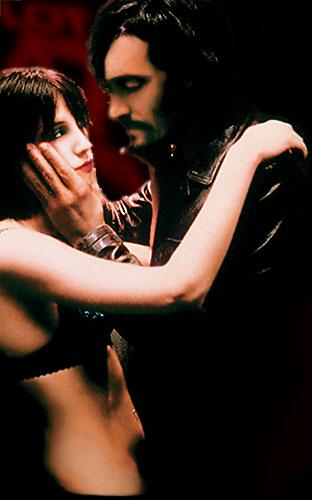
TROUBLE EVERY DAY
directed by CLAIR DENIS
If we're seeing an unexpected renaissance of art movies from all over the world- and I think we are- then surely French filmmaker Claire Denis is one of this minimovement's patron saints. Her films offer elliptical narratives with little notion of closure, a languorous, often dangerous eroticism and a desire to inhabit and subvert the conventions of genre movies: mysteries, thrillers, romances. For the most part, "Trouble Every Day" is a moody, troubling work, masterfully photographed, that drifts from one gray Parisian incident to another in the rootless spirit of Wim Wenders and Jim Jarmusch, Denis' acknowledged mentors. Be forewarned:Trouble Every Day has more in store than 1970s-style urban angst, its paranoid '70s-style plot about a dark scientific secret or, for that matter, star Vincent Gallo's '70s-style "Serpico" 'do. This is a sexual knife-twister, somewhat in the tradition of David Cronenberg's "Crash" (and, even more so, "The Brood") or Nagisa Oshima's "In the Realm of the Senses." Like those films, it's being released unrated by the MPAA, so most Americans outside big cities and college towns won't be able to see it at all, and when it appears on video Blockbuster won't carry it. Whatever you make of Clair Denis' movies, she never wants you to leave the theater unmoved or unshaken. She wants to turn you on and mess you up. She wants -- there's no better way to say this -- to fuck with your mind. And she's always going to be the one on top.
Andrew O'Hehir Salon.com
By Clair Denis, who emerged with ''Beau Travail'' as one of France's greatest filmmakers, Trouble Every Day explores with gruesome explicitness the metaphor of sex as cannibalism. The squeamish are strongly advised to avoid the film, which created a minor scandal when it was shown last spring at the Cannes Film Festival.
Stephen Holden, New York Times
Trouble Every Day is a fantastic exploration of human frailty, at the mercy of suddenly found ignorance. That person you?re in love with could always be hiding something, and no matter how hard you deny your worst delusions, sometimes the chemical impulses are out of your control. Its blunt imagery is enough to piss people off, but this collage is put together well enough to demand respect.
Rachel Gordon, CultureDose.net
Could be audiences at Cannes thought it was too much to take in all at once, since Claire Denis? provocative coup de grace Trouble Every Day aches with spiritual dread. Using the iconography of vampire films to illustrate religious fervor, Denis also shows reverence to the medium of film, particularly within the purity of silent movies. Rippling with ideas, Trouble Every Day is cinematically astonishing in ways we just aren?t used to anymore. It?s a reminder of why we call them motion pictures, told through vivid, expressionistic images. ...an art film that will baffle a certain percentage of the horror crowd, and a horror film that will turn off the art crowd. Those snobs were repulsed in Cannes by what they saw before them, but the idea of what's presented is more disturbing than anything Denis actually shows. She photographs acts of rapacious blood lust in a way that inspires contemplation, not revulsion. Those willing to place themselves into Denis' philosophical rhythms will find that what they're watching is representative of something else, as metaphors for our primal fears. In her final scene, Denis lingers on a single drop of blood on a translucent shower curtain. As it trickles down, the stains of guilt aren?t so easily washed away. Neither is the disconcerting resonance of Trouble Every Day.
Jeremiah Kipp, Matinee Magazine
Trouble Every Day
is complete heinous crap. Avoid it like the clap.
File13.com
|
| Tuesday 22 july 2003 |
PRIVATE SCREENING FOR MEMBERS ONLY
|
| Monday 28 july 2003 Time : 7:30 pm
|
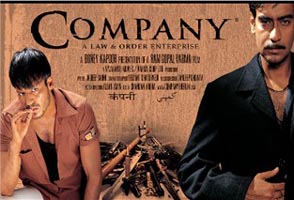
COMPANY
(2002) - directed by Ram Gopal Varma
COMPANY, a Bollywood gangster saga, equals
THE GODFATHER in scope and rivals Michael Mann's HEAT in terms of sleek style and cool visuals. With a huge cast of characters and locations that include Calcutta, Africa, Switzerland and Hong Kong, COMPANY may surprise viewers who thought Bollywood was only about romance and music. This film is a powerful look at a little known subject: India's underground crime syndicates. COMPANY recently premiered in New York City as part of Subway Cinema's "Asian Films Are Go!" film festival. Highly recommended.
|
| Tuesday 29 july 2003 Time : 7:30 pm
|
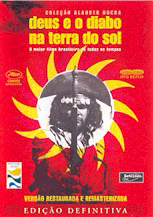
BLACK GOD, WHITE DEVIL
Glauber Rocha
Ted Shen
From the Chicago Reader:
A key figure in Brazil's leftist Cinema Novo movement of the 60s, Glauber Rocha became a balladeer for the downtrodden with this 1964 allegory about blind faith among peasants in Brazil's poor, barren northeast. Manuel, a cowhand who's killed a rancher in a rage, seeks salvation with a Christlike mystic, then with the last of the bandits fighting the landowning gentry. His futile quest and its many detours--based partly on folk legends--are described by a troubadour who sings off camera. Rocha, who wrote the script and most of the lyrics, consciously uses iconography from Eisenstein (Potemkin, Que Viva Mexico), Bunuel (Nazarin), and Godard (Les Carabiniers) to create a mise-en-scene that's decidedly European avant-garde, while he has the actors pose and speak in a deliriously theatrical manner derived from Brecht and Grotowski (Geraldo Del Ray is superb as the confused, impressionable Manuel). The fusion of European and Afro-Brazilian elements--dialogue, exquisite black-and-white images, and music by Villa-Lobos--is startlingly original and poetical in conveying the hope and despair of the oppressed.
Capsule by Jonathan Rosenbaum
From the Chicago Reader:
Widely regarded as the first major film by Glauber Rocha, one of the key figures of the cinema nuovo, this exciting 1964 Brazilian feature draws on myth and folklore in exploring the sertao in 1940. Strongly recommended.
|






